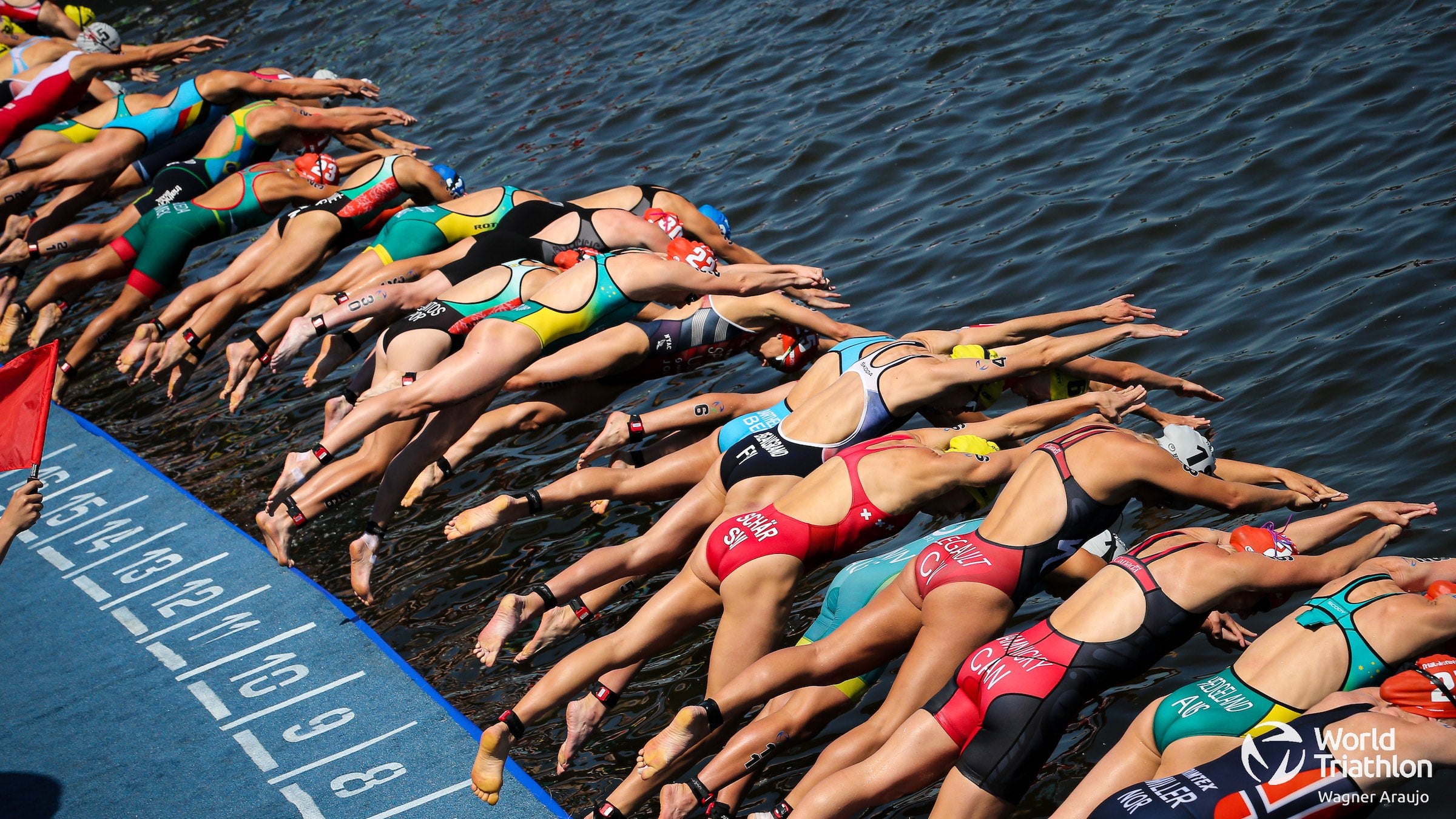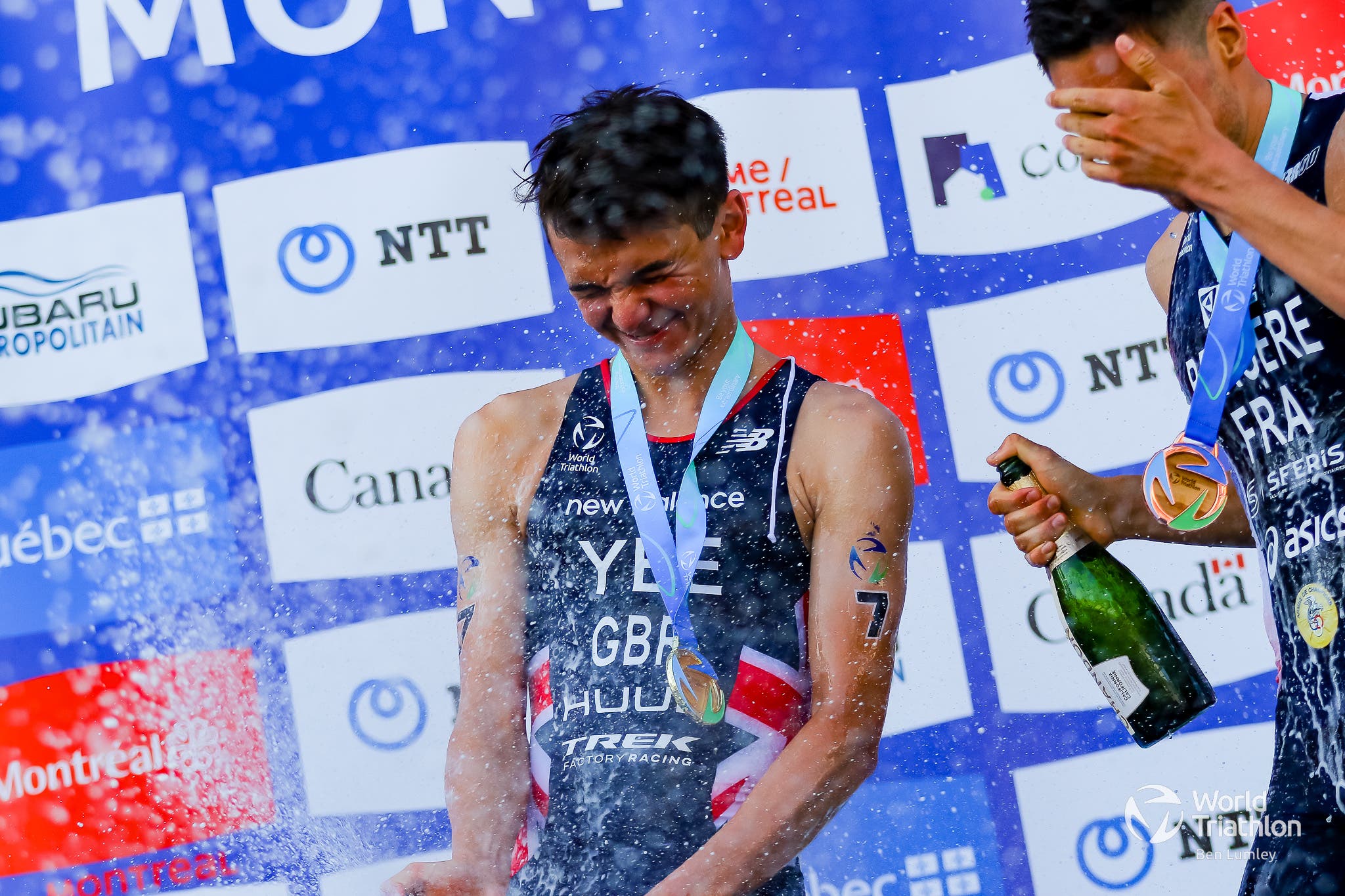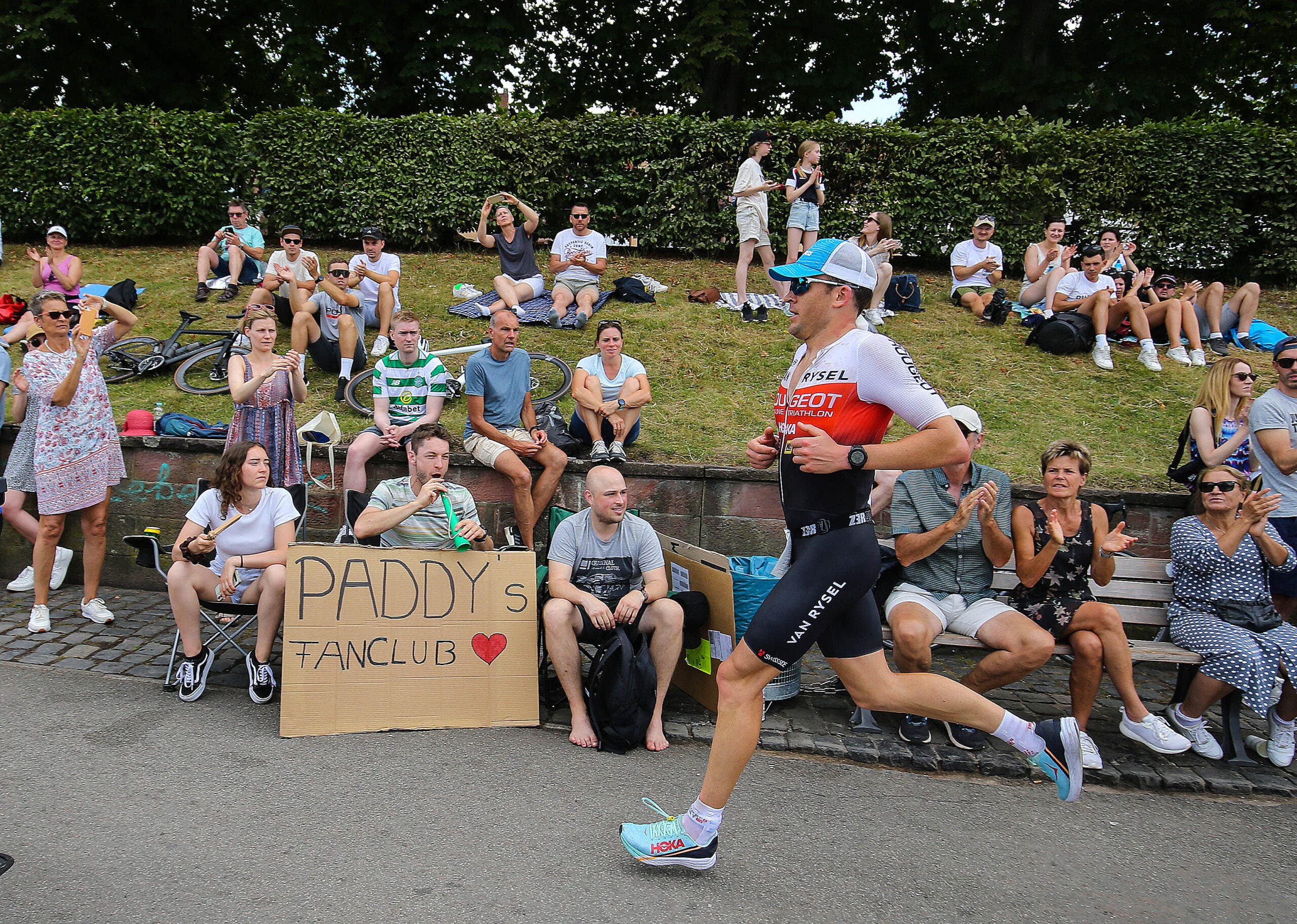Last Weekend Now: Bad Luck for Flora Duffy

The women dive in in Montreal. (Photo: Wagner Araujo/World Triathlon)
Last Weekend Now is your Monday rundown of what’s happening in pro triathlon, brought to you with commentary by Brad Culp. (Ed note: So yell at him if you don’t like the comments.)
It was a very busy weekend of triathlon around the globe. So busy that I can’t possibly cover all the races. While age-group races still struggle to sell out, professional racing seems to be in a better place than it’s ever been. This weekend we had marquee events in Canada (times two), Germany, Austria, France, and Denmark, so let’s get started with the return of the World Triathlon Championship Series in Montreal.

WTCS Montreal—And Relay World Champs
It’s hard to imagine a scenario where Britain doesn’t win at least three medals at Paris 2024, and four or even five isn’t out of the question. They will certainly head into the next Olympics as the favorites in both the men’s and women’s races—as well as in the mixed relay—where they’ll be defending gold.
After crashing out of the last round of the WTCS in Leeds, Alex Yee returned to the top of the podium in Montreal in the unique, eliminator format that World Triathlon is now rolling out once per year. Basically, 30 athletes raced a super-sprint triathlon and the bottom ten were eliminated. The remaining 20 raced again to cut it down to ten athletes for the third and final race.
I’m not sure that it makes for a better viewing experience, but it does look incredibly painful for the athletes, who seem to have a love-hate relationship with the format. In the end, the top 10 didn’t look all that different from a typical WTS event, with Tokyo silver medalist Yee outsprinting bronze medalist Hayden Wilde of New Zealand to win by three seconds.
Frenchman Léo Bergere finished just one second behind Wilde for third, a place he’s very familiar with. Bergere has now finished third in four out of the last five WTS races, with the only outlier being his runner-up finish last month in Leeds. It’s very possible that he ends up winning the world title without winning a race. He’s currently ranked first but is in a virtual tie with Wilde.
Frenchwoman Cassandre Beaugrande got the better of Georgia Taylor-Brown in Leeds, but the Brit flipped the script in Montreal, finishing three seconds ahead in the final race. Since winning two medals in Tokyo (silver in the individual and gold in the relay), Taylor-Brown has been on the podium at every race she’s started, including two wins. She now has a stranglehold on the WTS series lead, 1,200 points ahead of teammate Beth Potter, who finished third in Montreal. Surprisingly, it’s the first career WTCS podium for Potter, who hopes not to be the odd woman left off the incredibly stacked British women’s team for Paris. Although, after missing out the team for Tokyo, she went on to set a 5K world record on the road, so there’s that.
This was technically the sprint & relay world championships—earning GB and the US spots to Paris 2024 (the French winning team already has a spot)—but next up for the World Triathlon Series is Hamburg in two weeks, which is one of the most spectacular venues in the entire sport.

The Men’s Ironman European Championship + A Women’s Race
The women had their European championship in Hamburg last month, so this time around it was the men taking center stage, although there was also a pro women’s race in Frankfurt, as well, to make up for some other race that there wasn’t. There was not, however, a pro men’s race in Hamburg. If that sounds like it doesn’t make sense it’s because it doesn’t.
After a disappointing DNF at the world championship in St. George, Frenchman Denis Chevrot bounced back to win the second Ironman of his career, taking the win on the heels of a 2:38:44 marathon. That was good enough to finish three-and-a-half minutes ahead of Robert Wilkowiecki, which is the kind of last name you’ll only find in Poland or Chicago. (This Wilkowiecki is from Poland.) It’s only the third Ironman finish of Wilkowiecki’s career, and all three of them have been under eight hours; the two that weren’t were DNFs—for whatever that’s worth. The final podium spot was claimed by France’s Clement Mignon, which is something I would definitely order if I saw it on a menu.
It’s worth noting that the top 10 men all entered T2 within 30 seconds of one another. That’s not fair riding. Ironman needs to get harsher with the drafting penalties, especially at a regional championship. Or a half regional championship. Or whatever this was.
The women’s race was dominated by Germany’s Daniela Bleymehl, who won her second Ironman since returning to racing after the birth of her second child. She finished two minutes ahead of Britain’s Nikki Bartlett—one of just six pro women racing in Frankfurt. The splitting up of regional championships makes both races seem less significant. This was the weakest field I’ve ever seen in Frankfurt for both men and women.
The missing gold medalist in Mont Tremblant
Olympic champion Flora Duffy was set to race her second 70.3, but unfortunately the airline left her bike in Boulder, leaving her to watch the race, which was especially devastating because WTCS Montreal was going on just a few towns over. So she missed out on WTS points and missed her last chance to qualify for 70.3 Worlds. I don’t see any reason why Ironman couldn’t or shouldn’t offer her a wildcard spot. It’s in their interest to have both Olympic champions on the start line in St. George in October.
It’s hard to say if Duffy’s absence changed the top of the podium, because Tamara Jewett is one of the very few women on Earth who can run faster. The former pro runner has been focusing on tri for the last three years, and she might be the fastest woman on her feet at the 70.3 distance. A four-minute swim deficit was no problem for the Canadian, who ripped off a 1:20:12 half-marathon on a tough course to win the second 70.3 of her young career. This should move her near the top 15 of the PTO world rankings and give her a decent shot of making the poorly named Internationals team for the Collins Cup. American Amber Ferriera (say that five times fast) finished nine minutes back in second.
Lionel Sanders made it a double victory for the host country, winning the men’s race with a dominant bike leg even after a flat out of T1. He finished two minutes ahead of Mexico’s Tomas Andres Rodriguez Hernandez, who has as many names as he does races in his pro career. It’s a big breakthrough in just his fourth race, with his previous best finish being 15th at 70.3 Oceanside this spring.
The best of the rest: Challenge Walchsee, Ironman France & 70.3 Elsinore
- Frederic Funk upset Sam Long at Challenge Walchsee in the Austrian Alps. Long turned in the fastest run of the day but couldn’t catch the 25-year-old German, who was no doubt motivated by not wanting to look at Long’s race kit, which continues to get uglier and uglier with every race. I mean that as a compliment. It’s impossible not to look ridiculous in a tri kit. I admire Long leaning in to that as hard as possible.
- The women’s race in Austria was won by local athlete Simone Kumhofer. I’d be lying if I said I recognized any of the names in the women’s race. The only problem with having so many pro races on the same weekend is that a few of them get very watered down, but congrats to Simone for managing to win a race with a 1:28 half-marathon.
- At the other European Ironman, American Rudy Von Berg made his full debut at Ironman France, winning by three minutes over France’s William Mannesson and earning the Kona slot up for grabs. German Svenja Thoes won the women’s race by more than 20 minutes to nab her Kona slot and the $12,000 top prize.
- While there was a full men’s regional championship in Frankfurt, there was a half regional championship for both genders in Elsinore, which is in Denmark. Ironman 70.3 Elsinore brought out a few top names, because who wouldn’t want to do a race centered around a really sick castle? There were no surprises as Britain’s Emma Pallant-Browne and Denmark’s Daniel Baekkegard won comfortably. Currently ranked #5 in the world, Baekkegard is a virtual lock for Team Europe at the Collins Cup, while Pallant-Browne will likely be left out despite her #8 ranking. The entire top five in the current women’s rankings are European. So Europe is going to win in a landslide once again, in case you were wondering.